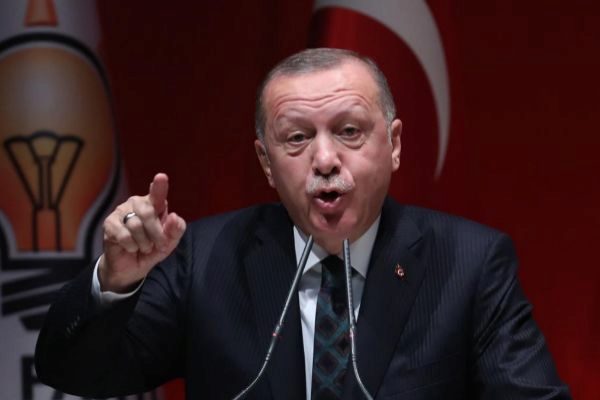- Migration: Turkey forcibly deported Syrian refugees
- Attack: Turkey launches its ground and air attack against Kurdish forces in Syria
The Turkish President has again used the drama of Syrian refugees as a throwing weapon. One day after launching its Peace Spring operation, and while northern Syria experiences a new exodus of thousands of displaced people, Recep Tayyip Erdogan has responded to all those countries that have criticized its military intervention. In particular against the European Union, which a few hours after the start of the offensive called on Turkey to "cease unilateral military action."
Calling "dishonest" the communiqués of Saudi Arabia, Egypt and the EU expressing concern about the events on the Turcosiria border, Erdogan, during a conference with the deputies of his bench, he told Brussels: "Hey, EU, wake up. I say it again: if you try to present our operation as an invasion, our task is simple: we will open the doors and send you 3.6 million immigrants. "
These types of threats have been constant since the entry into force of the infamous EU - Turkey agreement, whereby Ankara pledged to readmit any immigrant rejected in Greece in exchange for concessions that have not been fulfilled for political reasons. Erdogan, which in 2011 opened its arms to 3.6 million victims of the Syrian war, and has provided them with one of the best reception models seen, has turned 180 degrees in this policy to conclude that it has hurt him at the polls.
After a summer developing a controversial method of forced deportations of Syrian refugees to regions under Turkish control in northwestern Syria, Erdogan has sold his military intervention as a way to expand the space to resettle up to three million refugees. The second reason put forward is the presence of Kurdish militias, closely linked to the Kurdoturcan guerrilla PKK, at war with Ankara. Besides, these militias have been spearheading in the war against the Islamic State.
Paradoxically, at the moment, organizations on the ground indicate that more than one hundred thousand people have moved in the attacked area , mainly neighbors of the border towns of Ras al Ayn and Tel Abiad, in whose vicinity, according to Turkish sources, the army has initiated a shy territorial penetration. According to the Syrian Red Crescent, five civilians have died and at least 25, including children, were injured on the first day of attacks, on Wednesday.
For his part, Erdogan has affirmed before parliamentarians that "since the beginning of the operation, 109 terrorists have been neutralized . " The leader also stressed that, in his own country, "we have taken the necessary precautions to avoid defamation campaigns." According to local media, 78 people, including a journalist, have been arrested for their social media posts in relation to the Turkish-Arab offensive.
Meanwhile, aerial and land artillery bombardments, as well as skirmishes among militiamen, take place on a broad front that covers more than 400 km of strip in the hands of Kurdish autonomists . Supporting the Turkish army is the so-called Syrian National Army, a paramilitary force organized by Turkey for the occasion, and which includes, among its combatants, elements formerly linked to extremist-cut forces and close to al Qaeda.
The Syrian Democratic Forces (SDS), name of the coalition made up of Kurdish militias defending the Syrian north, has denounced the death of three civilians in the Turkish attack of a convoy of displaced persons from Tel Abyad. The Turkish Ministry of Defense has accused Kurdish forces of wounding civilians on Turkish soil , firing projectiles at residential areas across the border. In addition, in recent hours, sleeping cells linked to the Islamic State have intensified their attacks in the Kurdish rearguard.
Precisely, one of the concerns expressed by the West in relation to the development of the offensive is the fate of the tens of thousands of prisoners of the Islamic State, who until now languished in Kurdish detention centers and that, due to the referral of combatants to the front, threaten to escape. During his speech, Erdogan has raised his prison strategy. "Turkey will keep the Daesh fighters who must be imprisoned imprisoned, while sending others to their countries of origin, if they are accepted," he said.
According to the criteria of The Trust Project
Know more- Turkey
- Islamic State
- Syria
- European Union
- Refugees
International US takes custody of 40 fighters of the Islamic State, including two British
United StatesDonald Trump justifies the withdrawal in Syria because the Kurds "did not help us with Normandy"
Turkey Trump threatens to "destroy" Turkey's economy after clearing its offensive in Syria

